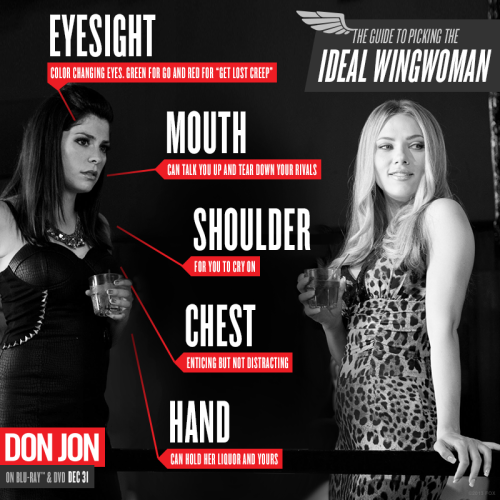Joseph Gordon-Levitt is an amazingly
talented actor. He did such an excellent
job writing, directing, and starring in Don Jon (2013) that I had to say a few
things about it, even after all this time.
The premise of the movie is an eligible
young bachelor, Jon (played by Gordon-Levitt), who is a notorious Casanova. Throughout the movie he reiterates a list of
things that are important to him: “my body, my pad, my ride, my family, my
church, my boys, my girls, my porn.”
Jon is also addicted to porn to the
point where he’s no longer satisfied with actual sex. Jon meets Barbara (played by Scarlett
Johansson), a beautiful young woman from an upper class family who falls in
love with Jon. Both want their
relationship to work out, but both have a problem.
Jon’s porn addiction and constant
viewing becomes a major thorn in Barbara’s side. At the same time, Barbara is enamored with
romance movies with predictable Hollywood happy endings. Both partners’ consumption of their preferred
media has given them severely unrealistic ideals on love and
relationships. Barbara wants the
working-class Jon to be her Prince Charming while Jon wants the uptight Barbara
to be his super-whore in the bedroom.
Needless to say, this is a recipe for
disaster.
The ill-fated lovers’ breakup gives Jon
the time and motivation he needs for some serious soul searching. In meeting and eventually dating a widow
named Esther (played by Julianne Moore), Jon comes to grip with his addiction
and realizes he needs a lifestyle change to be free from his addiction and
raise his quality of life.
This is a movie that hits home for a lot
of people. There are tens of millions of
teenage boys and adult men looking at pornography at any moment of the
day. Like any other addictions, porn
addiction can consume people and change their lives. Yes, porn actors and actresses are typically voluntary agents
utilizing their bodies to make a living in creating a product that men and
women around the world voluntarily consume.
However, continuously watching porn objectifies men and women alike as
sex objects. It’s voluntarily produced
and consumed, so it’s ultimately none of our business, but let’s just be real
about these false images our primal subconscious would have us believe.
As we see in Don Jon, porn distorts men’s ideals on women, sex, and
relationships. It’s not only prevalent
in porn, but in popular culture. Think
of all the music videos with scantily-clad women shaking their chests and
asses. Think of popular movies like
American Pie, which give young boys ludicrous ideas of how amazing high school
will be. (Frankly, I’m still terribly
disappointed that high school did not offer me the chance to get naked with a
foreign exchange student, have guaranteed sex on prom night, or to hook up with
a friend’s attractive mother. I want my four years back!)
The same applies to media consumed by
women. While many women do reject the
iconic image of the sexually empowered female in pop culture, they do often
tend to cling to images depicted in The Notebook or 27 Dresses. I can’t tell you how many women I’ve dated
with whom it didn’t work out, all because they seriously expected me to come
riding up on a white horse to take them to a million dollar house with two
cars. On the flip side, I've lost count of how many relationships could have blossomed if the woman wasn't scarred by some jerk who treated her only as a sex object.
These unrealistic images on our electronic screens of the ideal
man or woman are marketed and sold to people because those images are
entertaining. However, it’s always been
up to We the People to figure out that fiction—a pretend series of events in an author-controlled environment—is not to be mistaken for reality. What so many people
never realize is that life really does imitate art. Art itself embellishes life, and people who
consume one or another form of media often fail to realize that a true happy
ending takes a hell of a lot of work, compromise, and self-improvement.
In my opinion, the healthiest way to
approach to any relationship is for both partners to openly discuss and be on
the same page about where they are in life, where they’re going, and where they
want to be, both as individuals and as a couple.
What I especially love about this movie
is the way it portrays human action. We
might not think of the romances depicted in the movie as economics, but
economics is ultimately the study of human action. Dr. Ninos Malek, lecturer of Learn Liberty’s “Sexonomics”
seminar, would agree.
Economics plays a major part in dating
and relationships. When a woman expects
a man to provide her with a home and a certain standard of living, she’s
setting a major economic standard for the success of their relationship. Likewise, when a man expects a woman to
support him—or to be a stay-at-home wife and tend to his every whim—he sets a
major economic standard for the success of their relationship. In the latter scenario, the stay-at-home
wife’s education or career becomes the opportunity cost for his happiness. For Jon in the movie, his romantic and sexual
relationships become the opportunity cost for his happiness—porn.
By the time Jon and Barbara break up,
their relationship is a sunk cost.
However, this is where market self-regulation plays in. This break up is a very difficult sunk cost
for Jon to bear. He made a bad
investment and a series of bad decisions.
He’s faced with a choice to repeat those failures, or to correct his
behavior in order to never go through that kind of heartache—or sexual
dissatisfaction—again.
Jon chooses to renew his mind and change
his lifestyle. He breaks his porn
addiction and leaves porn behind. He
continues taking his night college courses not because his (now ex-) girlfriend
will put out, but because he chooses to create more opportunities for himself. Instead of club hopping and bringing random
women home for sex, Jon chooses to be in a relationship with the widow Esther,
who’s older and from whom he can learn a lot.
Best of all, the nanny state is in no
way involved in Jon’s transformation! It was never necessary to "fine" or "tax" or jail the pornographer or the porn addict. This
isn’t entirely different from someone kicking their drug habit.
While many people may get court-ordered
to Alcoholics Anonymous or Narcotics Anonymous, the ranks of those support
groups are dominated by everyday people who made their own decision to get
clean and voluntarily participate in the program. They’re tired of letting people down, they
know their lifestyle will be lethal if left ongoing, and they’re ready to try to
rebuild their lives.
Like a recovering addict, Jon’s changes
in behavior all result from social consequences. His actions cost him a relationship. He has to deal with the public scorn of women
he hooked up with and then discarded. He
identified that these events are indicative of failure, and he wants to
experience success. Don Jon is about personal responsibility—a concept we libertarians
hold in the highest esteem.
Being aware of economics as human action
made this movie even more enjoyable to me because I was able to see economics
happening and unfolding right before my eyes.
It doesn’t simply include money and graphs. Economics is all around us, not only in the
way we spend our money, but in the way we spend our time and in the company we
keep.
* * *
Don Jon movie promotional images courtesy of DonJonMovie.tumblr.com



No comments:
Post a Comment